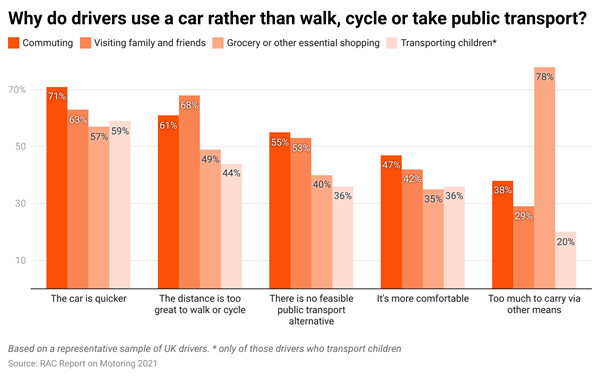Drivers more dependant on cars than ever, despite decline in commuting
and live on Freeview channel 276
Britons’ dependence on their cars has reached a 15-year high despite a decline in the traditional five-day-a-week commuting pattern.
According to data from the RAC most motorists don’t expect to return to a regular Monday-to-Friday commute but say they rely more on their car for work and leisure purposes now than before the pandemic, with fewer than ever viewing public transport as a suitable alternative.
Advertisement
Hide AdAdvertisement
Hide AdThe motoring body’s annual Report on Motoring found that before the pandemic 49% of drivers commuted five days a week but now only a third (32%) expected to return to this pattern. Three in 10 said they expected to commute between one and four days and one in five said permanent working from home meant they had completely abandoned the daily commute.
However, while they plan to use their car less for commuting, most drivers said they would still struggle without it. Eighty-two per cent said that they would struggle without a car - up from 79% last year and the highest proportion since 2006. And 20% said they would use their car more in future.
Drivers in rural areas were most likely to say they couldn’t live without a car, with 87% reliant on it, compared with 77% of town and city dwellers.
The study of driver habits found negative attitudes towards public transport were driving the increasing reliance on cars.
Advertisement
Hide AdAdvertisement
Hide AdFewer than half of drivers (46%) said they would use their cars less even if public transport was improved, down from 59% just three years ago, and 45% said that they planned to use public transport less as a direct result of the pandemic.
Only 22% said public transport was an attractive alternative to taking the car, with drivers citing the speed and convenience of the car compared with public transport as among the key reasons.


RAC data insight spokesman Rod Dennis said the findings showed how the pandemic had affected the public’s view of cars as well as illustrating the struggles faced by politicians trying to promote public transport as a viable alternative to the private car.
He said: “Many drivers clearly expect that ‘hybrid working’ will become the norm which could have a profound effect on the overall volume of vehicles on the roads during the week – although whether it signals an end to congestion during peak hours is another matter.
Advertisement
Hide AdAdvertisement
Hide Ad“It’s also clear just how important the car is to so many people, a relationship that appears to have strengthened due to Covid-19. In so many cases, the car is faster, more reliable and is really the only feasible option for the sorts of distances people travel.
“But perhaps one of the starkest findings from our report is around attitudes towards public transport. If the challenge faced by policymakers in getting drivers out of their cars before the pandemic was akin to trekking up a steep hill, our research suggests they now have a veritable mountain to climb.”
